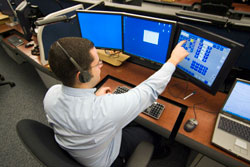 When Lockheed Martin began modernizing the flight service system in early 2007, pilots experienced an array of issues, including lost flight plans and long hold times. But for most of 2008, Lockheed has met its performance standards for briefers to answer phone calls within 20 seconds and radio calls within five seconds, and file flight plans within three minutes.
When Lockheed Martin began modernizing the flight service system in early 2007, pilots experienced an array of issues, including lost flight plans and long hold times. But for most of 2008, Lockheed has met its performance standards for briefers to answer phone calls within 20 seconds and radio calls within five seconds, and file flight plans within three minutes.
In addition, Lockheed Martin has indicated that it is emphasizing the quality of the briefings and expanding the knowledge base of its briefers.
During a meeting with Lockheed last week, AOPA continued to emphasize the need for briefers to be well versed in “local knowledge.”
“It appears that flight service performance has turned a corner,” said Randy Kenagy, AOPA chief of staff for government affairs. “The performance measurements are being met, but we need to continue to focus on the quality of the information that briefers are giving to pilots.”
“It is important for our Lockheed Martin Flight Services team to continue to improve customer service for the flying public, and that includes constantly refining and improving local area knowledge,” Ron Petro, Lockheed’s flight service program director, reassured AOPA. “From a performance perspective, our quantitative measurements have shown monumental improvements from 2007 to today. Our focus continues to be on the service we provide to the pilots, and we are constantly working to enhance the flight service experience for them.
Many pilots had expressed concern during the modernization phase that consolidating FSS facilities would take away briefers in their area who had years of local knowledge. Lockheed maintained that briefers would be trained in specific areas of the country, so that they would be well versed in specific geographical locations, regardless of where they were stationed.
As long as pilots select the area from which they are calling on the telephone prompt, they should be transferred to someone who is trained for that area, even if the person working several states away.
AOPA has explained to Lockheed that pilots who are inadvertently transferred to a briefer not trained for their location should be told that it is not the briefer’s area of specialty and given the option to be transferred to the correct briefer.
“Lockheed took on a large project when they modernized the FSS system, and there were some major growing pains along the way,” Kenagy said. “The system seems to be running smoothly now, but we’re going to work with Lockheed on more improvements.”
